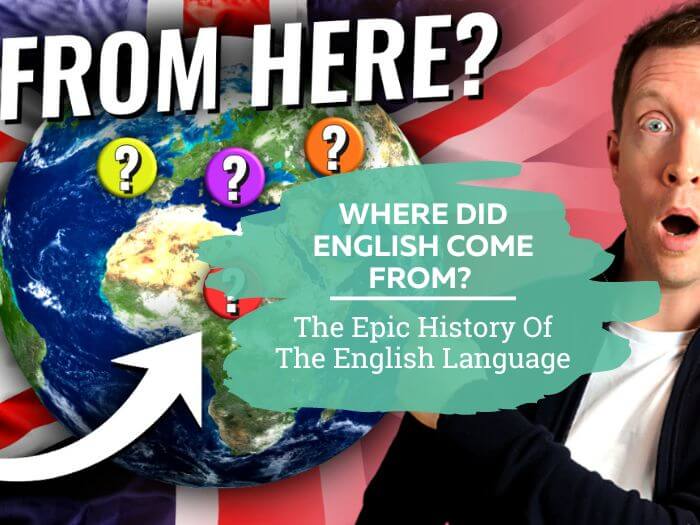English is the biggest language in the world today.
But did you know… it almost didn’t make it.
In fact, the language you speak today and take for granted almost became a different language altogether.
So where did English come from?
This story of where English came from is gonna give you dinner party material for the next 5 years.
If you prefer watching videos, hit play on the video version of this post below. Otherwise, keep scrolling to find out: where did English come from?
Table of Contents
What Is English?
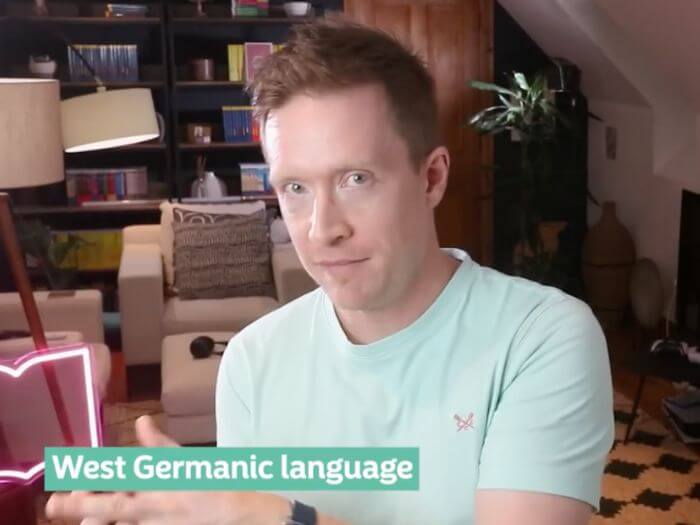
English is a West Germanic language.
And the word English even comes from one of the ancient Germanic peoples that migrated to the island of Great Britain.
They were the Angles – a West Germanic tribe. And speakers of English are called Anglophones.
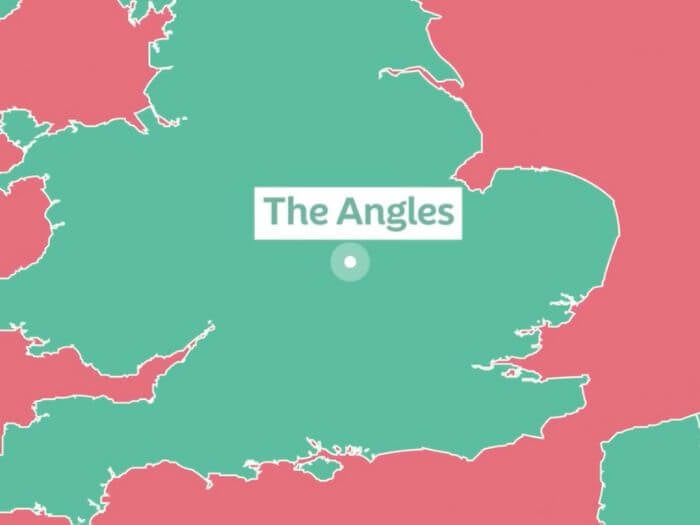
English is of course the main language of the UK, Ireland, the USA, New Zealand, Canada, Australia and more. And it’s used and spoken across the globe by one-point-five billion people.
In fact, English is the official language of 67 countries, and if you’re reading this post, I’m counting you!
Celts And Romans
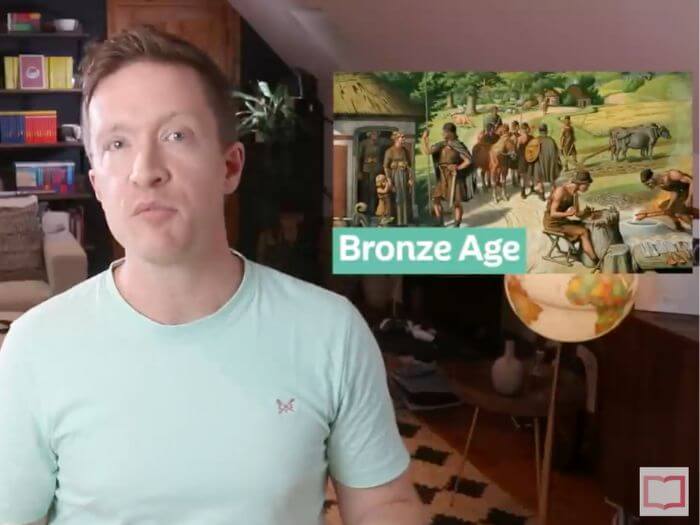
The very first speakers of English lived in early medieval England.
But English didn’t entirely originate in England, and the real story begins way earlier.
In the late Bronze Age, inhabitants of the British Isles spoke the ancestral language called Common Brythonic or Brittonic.
And this is the language Julius Caesar found them speaking when he invaded in 55 BC – a near-disaster that lasted only 3 weeks!
Between the clever Celts and the British weather, his plan failed.
But the Romans wrote that the language they’d heard sounded similar to Gaulish. Interesting…
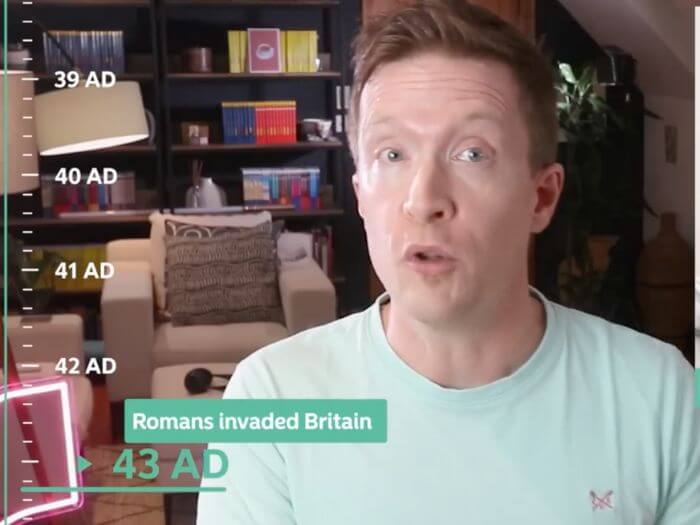
Some time later, in 43 AD, the Romans invaded again, beginning Roman rule of Britain.
This time they stayed for nearly 400 years, and the new culture of the Isles was Roman-British.
So if you ever wondered why most English words have Latin roots, there’s your answer!
But as you may know, the Romans always met their match in the end.
Germanic Tribes

After the Roman empire fell, new invaders arrived.
More specifically, these new invaders – the Angles, Saxons and Jutes – came from northern Germany and Denmark.
They drove the native Britons west and north into what is now Scotland, Ireland and Wales.
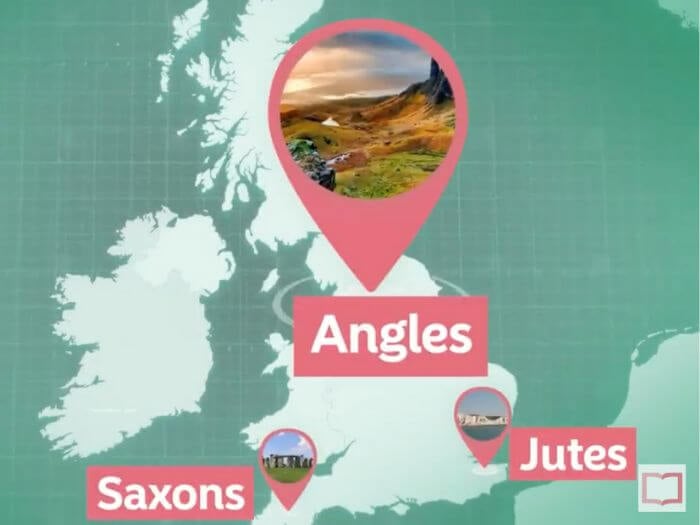
The Jutes settled in Kent, the Saxons settled in south west England and the Angles took the rest of the country, including Scotland.
Each tribe kept their own land and their own dialect.
But it was The Angles who dominated the land, and their language helped create the name England, which represented a country of three tribes.
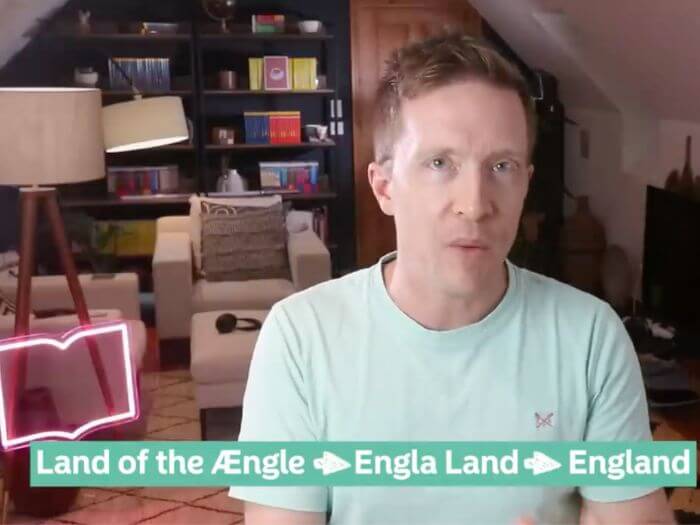
Old English
Time went by, and the tribal languages became Old English, and people who spoke it, we call Anglo Saxons.
But even if English is your native language, you’d have great difficulty understanding Old English today!
What do you think? Does it look hard?

When the very first Old English writing appeared, most texts were written in the West Saxon dialect.
They had some strange letters, but we’ll come back to that!
There was something else that played a huge role in getting people literate: British Latin.
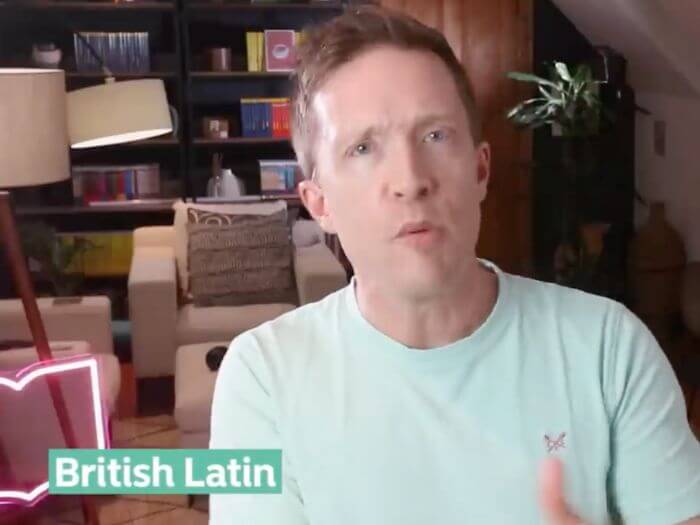
Because of the Roman occupation, many new words entered English, although there wasn’t a spelling standard yet, so you could spell words any way you wanted to.
In fact, spelling could give away which part of the country you were from, and this is how England ended up with four major dialects.
From this era up to the 10th century we have authors who gave us a lot of great literature – fascinating poems that tell stories of heroic journeys and wild battles.
In fact, I dare you to confess if you’ve never heard of this one:

Beowulf is a story of a fierce struggle between the hero and a bloodthirsty monster called Grendel. And it's the longest epic poem that exists in Old English.
The only one that survived, at least, and it has about 3000 words you won’t recognise today!
As for the grammar, Old English had three grammatical genders and four case endings. In fact it was a lot closer to German than to modern English!
In the final phase, Late old English, something dark was coming – a thing that would change the language forever.
Vikings
“Immense whirlwinds, flashes of lightning and fiery dragons were seen flying in the air…”
This is what the Anglo Saxons wrote about the day the Vikings attacked England at Lindisfarne, in 793.
I guess it was bad!!
Things kept getting worse, but the real nightmare began in 865 AD.
New Vikings battled the West Saxons and killed their king.
His brother King Alfred the Great took his place, called a truce with the vikings and named their language English.
Alfred was a king who loved poetry and believed in education and he had many great Latin books translated into English so that people could read them. Nice guy!!
He was also one of the first English writers, and he wrote about what he called the [Angelcynn] Angle-kin – “race of the English”.
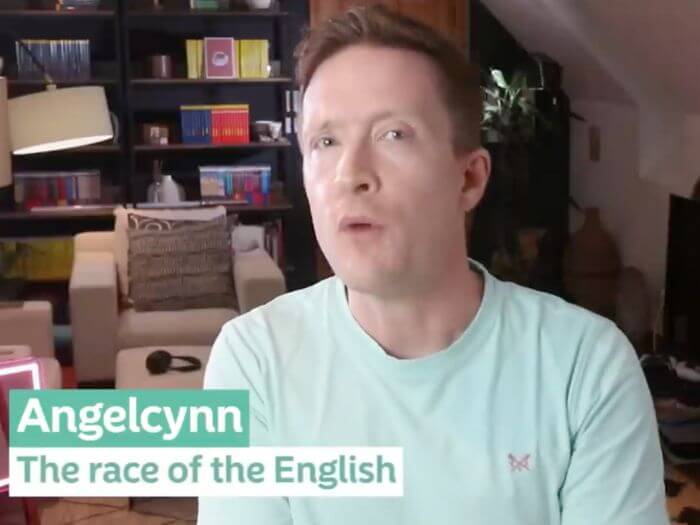
But the invasions from Scandinavia weren’t over.
They kept coming until the 11th century. So it’s not surprising that eventually English speakers and Vikings understood each other’s languages.
And this is how English got saturated with Old Norse words, like smile, skirt, silver, reindeer, muggy, freckle, egg, die, cake, awkward, anger, window, husband, egg, and skull.
What’s really funny is that it was the Norsemen who caused English to lose its inflectional endings, because they couldn’t pronounce various endings of English words!
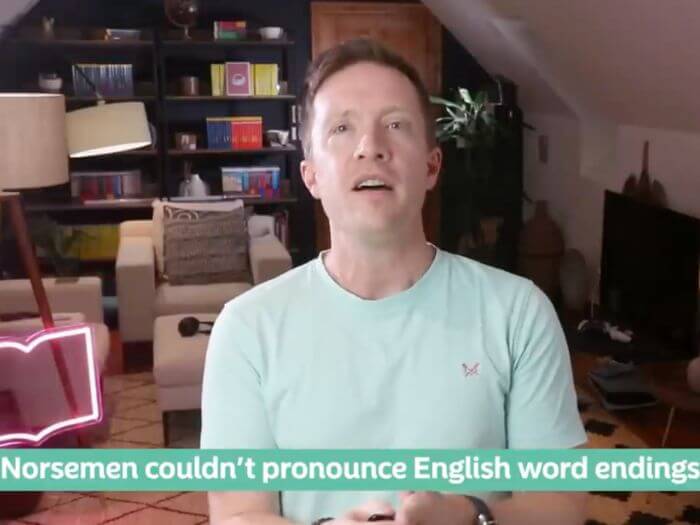
But they weren’t the last kind of invader to ravage England.
Oh no.
But let’s catch our breath for a moment and see how English writing was coming along.
Writing Systems In English
Want to hear the first English sentence ever written down?
Here goes…”This she-wolf is a reward to my kinsman.”
It’s a runic inscription on a gold medallion that was found in Suffolk.
Yep – before the Latin alphabet, people wrote with runes!

These were Anglo-Saxon runes, and the alphabet had between 26 and 33 letters.
Later, some Irish missionaries introduced a type of Latin script called half-uncial, which was easier to read and write.
There were a few more changes, and spelling came closer to Old French spelling.
That’s why we write “queen” now instead of “cwen”.
The next alphabet we had was the Old English Latin alphabet.
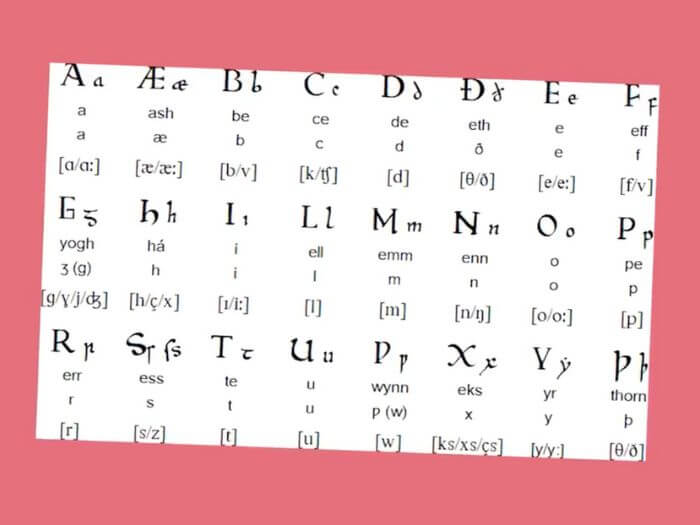
It had 24 letters and took us into the 12th century.
Most of the letters were taken straight from Latin, but some Old English sounds didn’t have an equivalent Roman letter.
These two – Æ Ð – were modified Latin letters, and these two – Ƿ Þ – came from the runic alphabet.
They didn’t use Q and Z except for in foreign names, and K was optional.
And that’s not all…
Old English had a funny kind of shorthand called Tironian notes, although it disappeared eventually because it was associated with witchcraft.
But that’s a story for another day!
Middle English
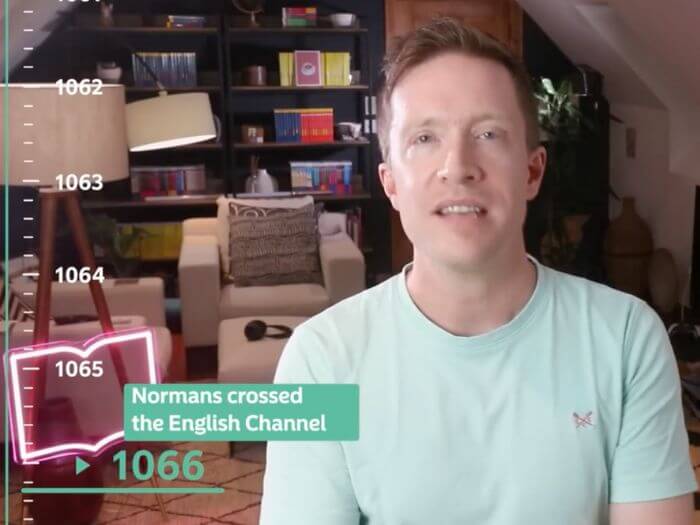
The Normans were descendants of the Vikings who’d already invaded France, and so they had curious ancestry. And they spoke a French dialect.
One night, led by William the Conqueror, they came across the English Channel and Old English was about to take a dramatic turn!
Legend says the English King Harold was killed by an arrow in the eye.
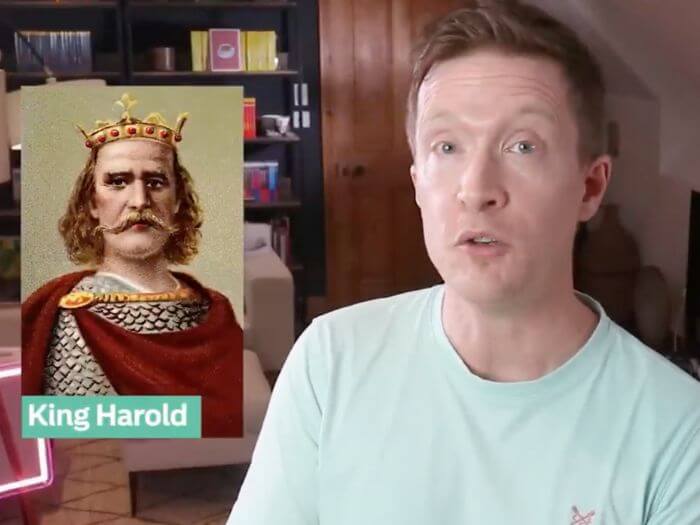
The tribes started splitting, and with Norman kings ruling for the next 300 years, Old French and Latin really kicked English in the teeth.
Suddenly all the fancy people spoke French, and the scholars and church people spoke Latin.
English dropped to a third language that commoners spoke, and the amount of dialects was just ridiculous.
You taking notes?
Ever wondered why English often has totally different words for the same thing?
Well, the Anglo-Saxons were hunters and farmers, so it makes sense that animal words came from them.
But the upper-class French gave us culinary terms, like boeuf.
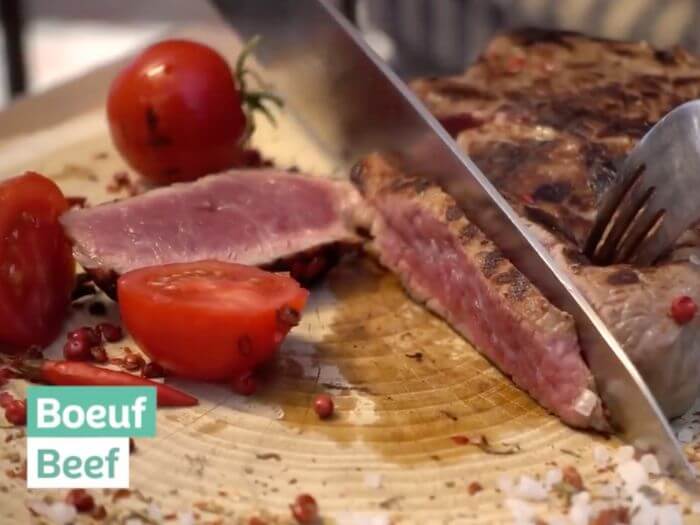
It happened with other kinds of words, too, like want vs desire.
In fact, Norman French introduced more than 10,000 words into English! Some examples are: governor, traitor, peasant, servant, duke, colour, chess, romance, poet
English word order changed from subject-object verb to subject-verb-object.
It was a time of enormous grammar changes in English!
New pronouns, new verb constructions.
Even pronunciation was changing.
As if all this weren’t enough, in the 12th century a boat load of words arrived from central France!
We all complain about languages being so hard to learn. But back in the day, it was really common for professionals to be trilingual, and speak three languages on a daily basis.
Late Middle English
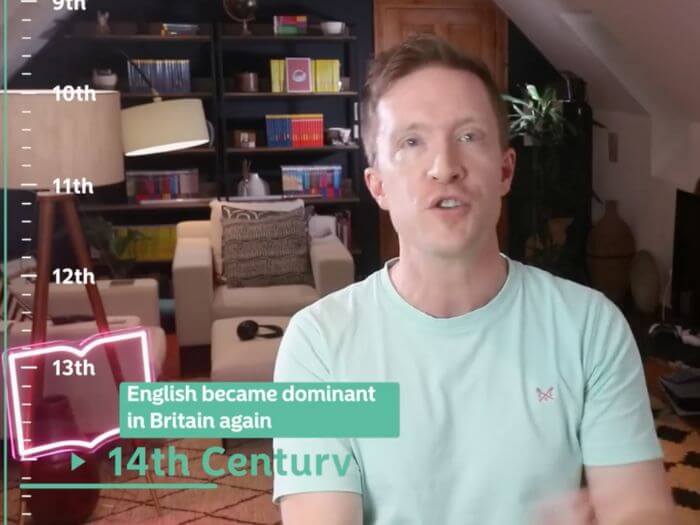
In the 14th century English became dominant in Britain again – chock-full of French, Latin and Scandinavian words.
A writer called Chaucer was so popular that the way he used English was more or less approved as the right way to do it. No joke!
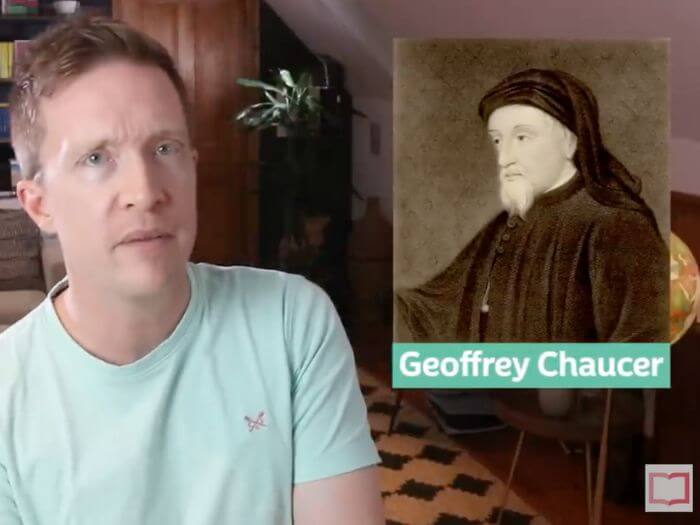
Writing is powerful stuff – remember that.
Chaucer mainly wrote in a London dialect of late Middle English, and one of his most famous works is the Canterbury Tales.
Take a look at the extract below. Can you work out what it means?
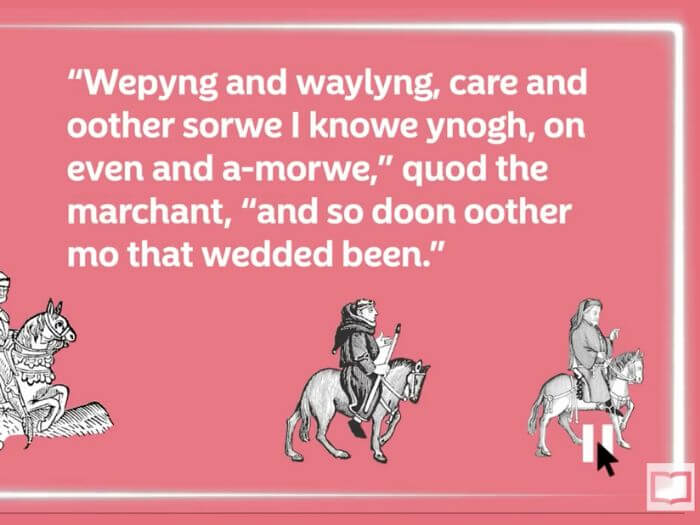
Until now, school kids had been learning in Latin, but in 1348 English became the new language in most schools.
And in 1362 they enforced English in the courts with the “Statute of Pleading” – no French, no Latin, only English!
There was an explosion of interest in English writing, and people would write in whatever dialect they spoke.
They had these storytelling contests – storytelling was the main entertainment of the day, and the winner got a crown and a free dinner!
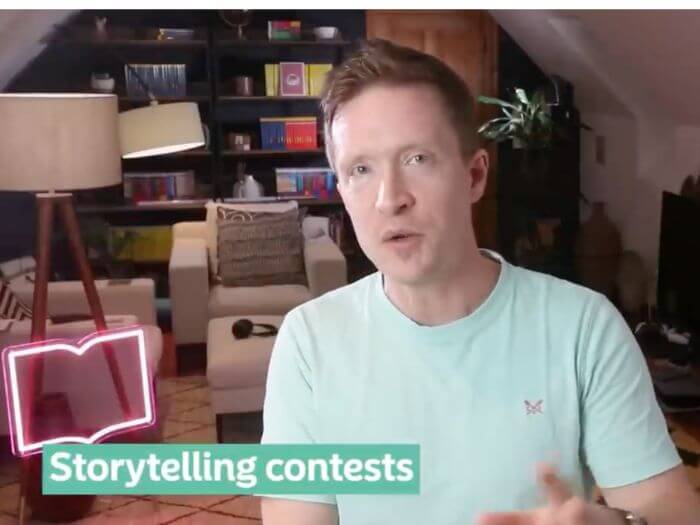
Maybe I’m a bit old-fashioned, but the way I see it, if those people loved stories so much, and were easily trilingual, obviously stories and language go together like (tequila and lime, or tea and biscuits)!
If you don’t believe me, you might like to take a look at the way we teach languages here at StoryLearning.
It’s called the StoryLearning method for a reason. It’s because we teach through stories. And you can learn a new language very effectively this way.
And it feels like a big breath of fresh air from what you might remember from school!
Now, back to it…
By the year 1400, London was the biggest city in England and the way people spoke was changing rapidly.
Explorers and traders brought beautiful new words from Spanish, Arabic, Italian and Turkish.
During the mid-1400s they introduced a standard called Chancery English.
The story goes that the clerks working for the Chancery in London spoke fluent Latin and French, and it was their job to prepare the court documents.
So they had a huge influence on how English was used, and their dialect sounded more like how we speak today. See how much you can understand in the video below.
This is the version of the language used for roughly 300 years.
By now, no-one was using runes to write anymore.
Although when runes started fading out, not everyone was happy about it and they tried to keep them going.
There’s a poem called the Old English rune poem.
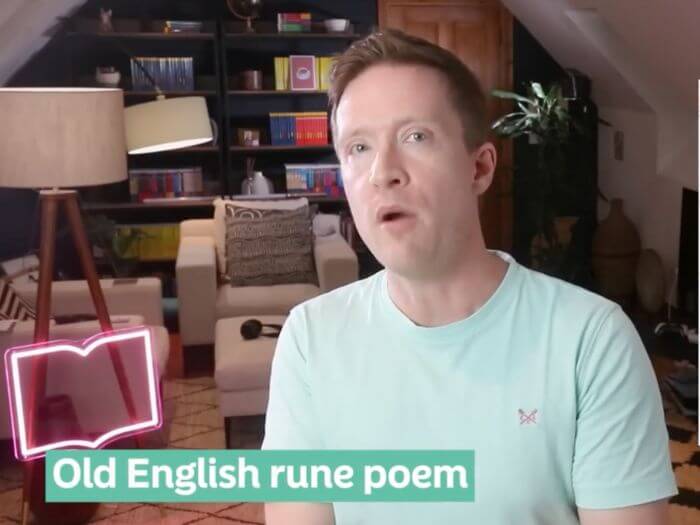
Each stanza is a riddle, to which the name of the rune is the solution – isn’t that cool?
Today, what do we have?
Tiktok?
Sword And Sorcery Tales
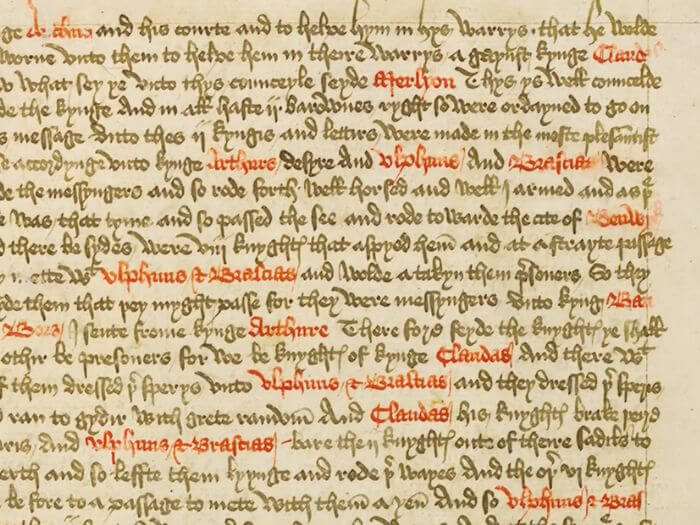
There was this writer called Thomas Malory who loved stories of King Arthur and Sir Lancelot, and he wrote a book in prison: Le Morte D’Arthur.
Why he was in prison makes a very long reading list, but between prison escapes, he changed English!
See, instead of writing in the usual formal style, Malory decided to write this epic story in his own words.
And what do you know?
It became the world’s first printed bestseller!
By the time Henry the 8th was King of England, the commoners could finally read in a language they understood, and the common dialect spread like wildfire.
Early Modern English
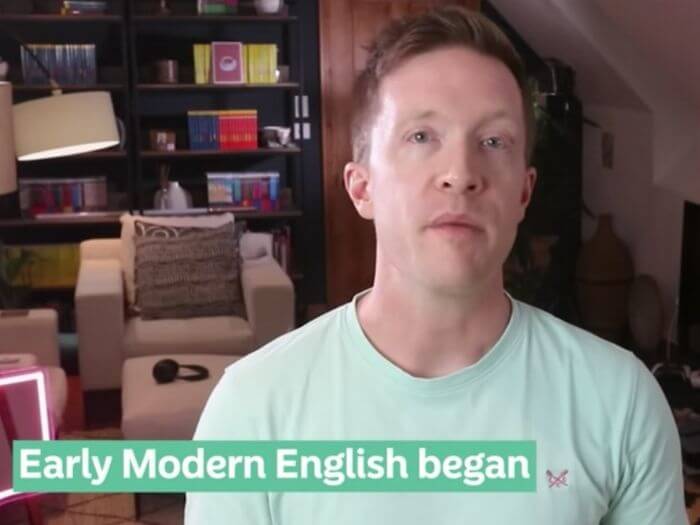
It was the late 15th century, and something strange started happening with the way people pronounced their vowels.
And so began the Great Vowel Shift!
It was going to have a profound effect on English.
You know those pure vowel sounds that many continental languages have? English lost them.
And this is how Early Modern English began.
Around the same time, the printing press was invented, which made it super easy for common English to become mainstream.
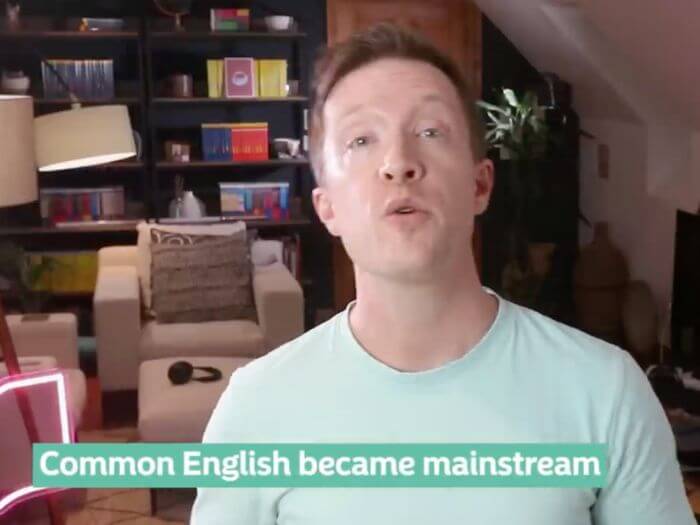
It also meant they could standardise English spelling rules, punctuation and grammar – no more spelling a word any old way you wanted!
So which dialect do you think became the standard one?
The dialect of London, of course.
That’s where most publishing houses were.
Books became cheaper, and more people learned to read.
They printed and distributed the Bible, and the English language became very important.
But someone else was about to take the world by storm.
Who could it be?
Enter William Shakespeare

If you were looking for Shakespeare, you found him!
The stage was set for the great actor and playwright who’d bring us 39 dramatic works in a whole new kind of English.
Now, English had been going through a bit of its own drama.
It was in contact with all sorts of other languages because of things like war and colonisation.
When the Renaissance from Europe hit England, suddenly English was also picking up Greek words, and a whole bunch of new Latin root words.
England was swimming in different dialects and accents… Again?!
It was actually quite a mess!!
Anyway, Will and his mates found it frustratingly hard to express themselves using normal English, so they got creative.
They stole and modified words from other languages to create vocabulary like – bloody, laughable, obscene, gnarled, gloomy, palmy, radiance, suspicious, amazement, assassination, lonely, dwindle and submerge.
But he also came up with other words that never quite caught on – wappened, armgaunt, infamonize, eftes, impeticos, insisture, pajock, pioned, sluggardiz'd, smilet (half-smile).
Probably just as well, eh?!
Altogether, Shakespeare invented about 1700 words we still use.
Yeah, wipe that smilet off your face, you green-eyed monster.
The Academy Attempt
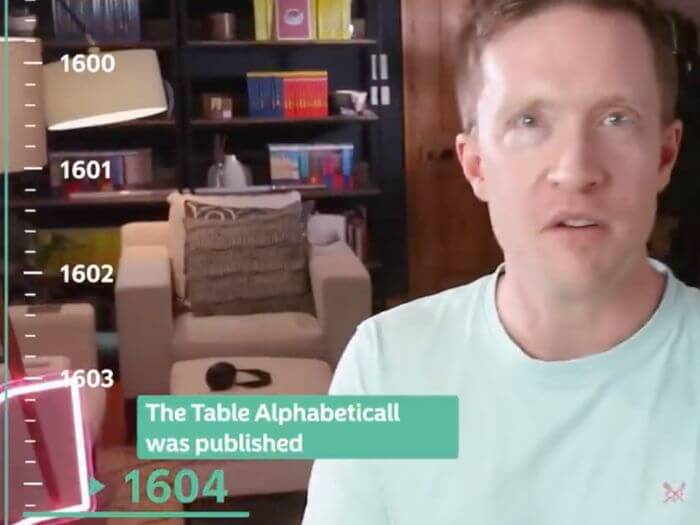
In 1604 the first English dictionary was published: The Table Alphabeticall. How’s that for a name?
But it was going to take a long time for them to settle on a dictionary everyone was happy with, and there’s a real cracker coming up!
Have you ever noticed that English doesn’t have an Academy like SO many other languages do?
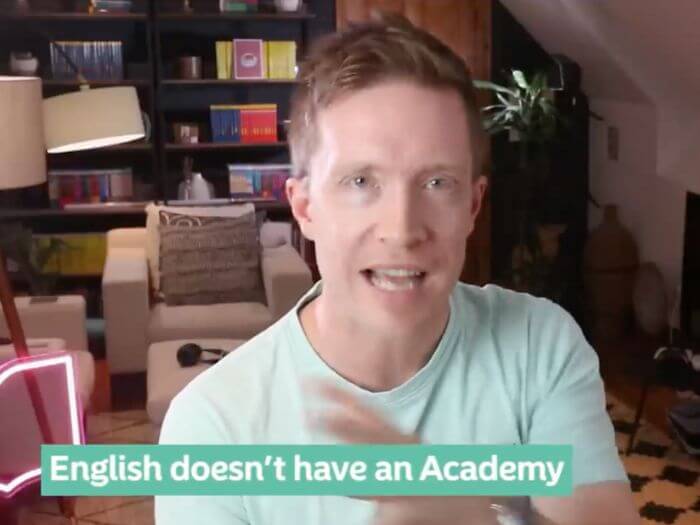
Well, it’s not like they didn’t try…
In 1662 they set up a committee like the French Académie Française with the idea to improve English. But it didn’t work.
Later on in 1712 a guy called Jonathan Swift tried again, but he failed, too.
English had plans of its own!
The Grammarians started writing books of rules for English.
Meanwhile, England had come through chaos with the English Civil War. And war gets people emotional so the rise of poetry and philosophical writing began.
In 1755 an absolute legend of a guy – Samuel Johnson– wrote an enormous English dictionary that sorted out the unruly mess that was spelling and grammar.
You’ve got to see some of these entries – they’re brilliant!!
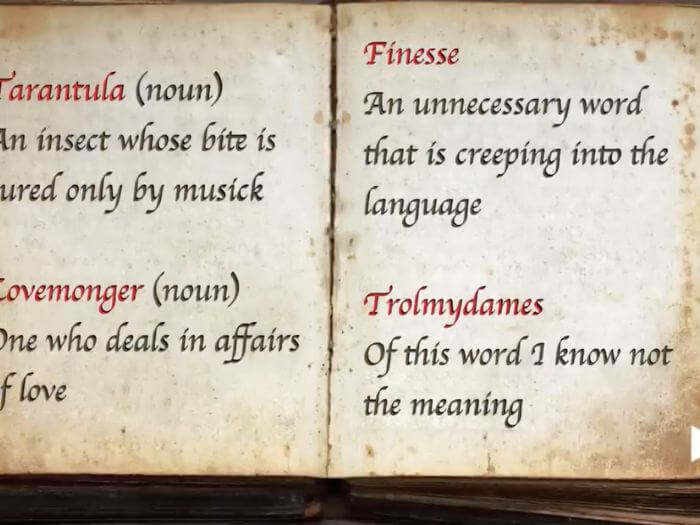
He deliberately left out most francophone words, which he hated.
To this day, English still has no academy.
We probably need one, but we don’t want to start a war.
Late Modern English
If you think English was done with new vocabulary, think again!
First, the Industrial Revolution happened.
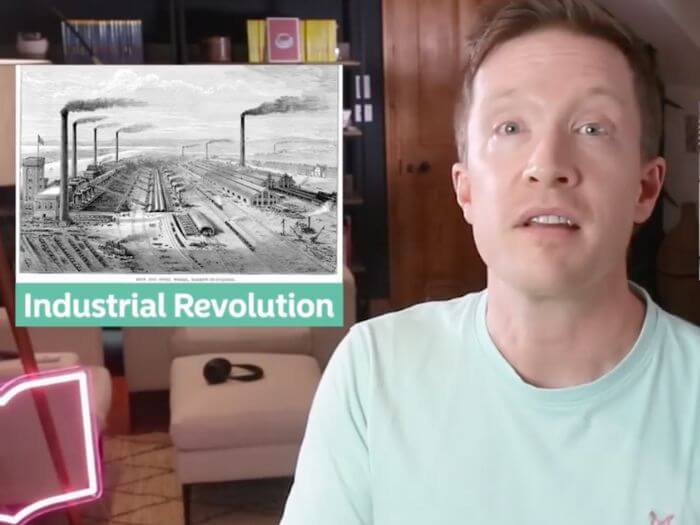
Suddenly there were all these new concepts in science and technology that we needed words for. And the scientists and scholars chose to invent them using Greek and Latin roots. Why not, right?!
Second, by 1922 the British Empire covered a quarter of the earth's surface. That’s a lot of new blood.
Now throw in all the other trading and imperial nations that came along.
It’s no wonder we ended up with hundreds of dialects!
Today, every subculture of English has its own nuances of vocabulary, grammar and pronunciation.
Did you know that many Americanisms were originally British?
Preserved in the colonies, but lost in Britain!
And that’s a whole other thrilling story waiting to be told.
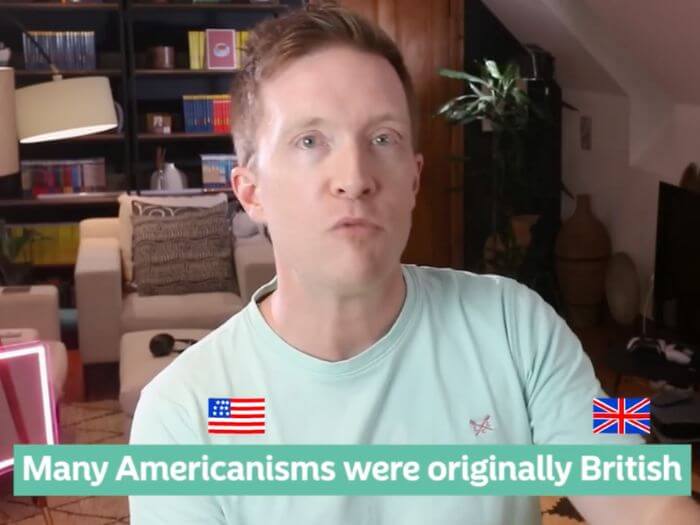
Alphabet And Pronunciation
In case you somehow didn’t ever catch this, the 26 letters you write with are the Roman or Latin alphabet.
And the word “alphabet” comes from the first two letters of the Greek alphabet: alpha and bēta. This post will reveal all about the origins of the alphabet if you're into that.
As for English spelling, one of the most frustrating things is that words with the same vowel structure don't always rhyme.
There are seven ways just to spell the sound ‘ee’.
Read this sentence aloud:
“He believed Caesar could see people seizing the seas”.
Crazy!
As if that wasn’t bad enough, there are nouns and verbs that are spelled the same, but pronounced differently, like “record” or “permit”.
You can learn more about how to pronounce them in my post on the rules of English pronunciation (it's rule number 27 by the way).
And did I mention contronyms? Contronyms have two meanings that are complete opposites.
Bottom line: English spelling is hard, but it’s also fascinating, and I'm pretty sure you get it after the mad history you just heard!
Where Did English Come From? Astonishing English
The best part about English is its mind-blowing usefulness.
No other language comes close to being so widely understood.
No matter what your accent or even your dialect is, you can make yourself understood by anyone else who speaks English.
Incredible, huh?!
If you'd like to make learning English easier and more enjouyable thanks to stories, please check out my short stories in English books.

Olly Richards
Creator of the StoryLearning® Method
Olly Richards is a renowned polyglot and language learning expert with over 15 years of experience teaching millions through his innovative StoryLearning® method. He is the creator of StoryLearning, one of the world's largest language learning blogs with 500,000+ monthly readers.
Olly has authored 30+ language learning books and courses, including the bestselling "Short Stories" series published by Teach Yourself.
When not developing new teaching methods, Richards practices what he preaches—he speaks 8 languages fluently and continues learning new ones through his own methodology.
